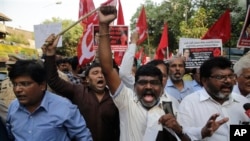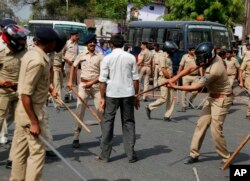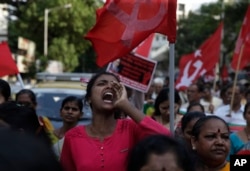At least eight people were killed in India Monday, as low-caste Hindu groups led violent protests against a Supreme Court ruling on the SC/ST Act, a 1989 law meant to protect them from caste discrimination but which they claim was weakened by the Supreme Court.
In several northern and central states, tens of thousands of low-caste Dalit protesters who had called for a nationwide shutdown blocked traffic, squatted on rail tracks, attacked vehicles and hurled stones at policemen. Markets and schools were shut down in many towns and cities. Thousands chanted slogans in the capital city of New Delhi.
Most of the victims died in clashes in the central state of Madhya Pradesh, according to police. Internet services were suspended in many places to prevent the protests from spiraling. In some states like Punjab, with a substantial low-caste population, the army was on standby.
Dalits, who are at the lowest level of Hinduism’s complex caste hierarchy, have been angered by a recent ruling by the top court that bars the immediate arrest of a person accused of a caste-related crime and sets severe limits on bail.
The strict law was enacted to protect marginalized communities from discrimination. But prompted by concerns that it was vulnerable to misuse, the court said arrests should only be made following an inquiry. The court noted that about 15 percent of the complaints filed in 2015 were false.
Low-caste groups, fearing the ruling will expose them to more harassment, complained that the law was already poorly enforced and that conviction rates were low.
Caste discrimination deeply entrenched
The government has appealed for calm and said it is seeking a review of the ruling.
“A very comprehensive review has been filed, and I say with great respect that the government does not agree with the Supreme Court,” law minister Ravi Shankar Prasad told reporters. “Our commitment for the welfare of Dalits and tribals is complete and total.”
In recent decades, affirmative action has helped many Dalits, who for centuries could only perform menial tasks, such as cleaning toilets and picking up garbage, rise into the middle class and has improved many lives.
However, caste discrimination remains deeply entrenched, particularly in rural areas. Last week, news reports said a Dalit man in the western Gujarat state was beaten to death by upper caste villagers because he owned and rode a horse - considered a status symbol of the upper caste.
Dalits make up some 200 million of India’s 1.2 billion people.
This is the second time this year that India has witnessed protests by low-caste groups. In January, Dalit protests erupted in the western Indian state of Maharashtra, following an alleged attack on them by right-wing groups in the city of Pune.
The growing anger among Dalits could pose a challenge to Prime Minister Narendra Modi’s Bharatiya Janata Party as it seeks re-election in national elections scheduled for next year.






